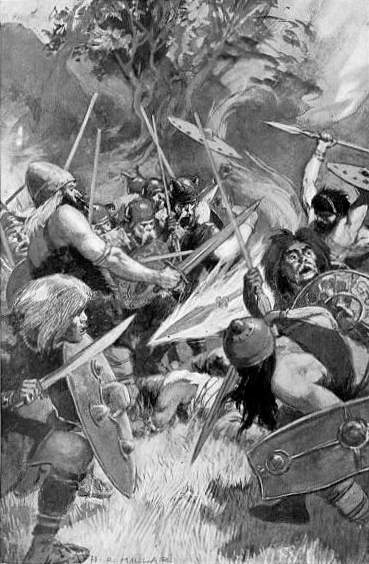
The pagan originated holiday celebrated the first harvest of the year. With feasts of bilberries, apples, and corn, it was a time to give thanks for a bountiful harvest that would see the people through the long winter to come. It corresponds to harvest festivals in other countries, including the English Lammas. Cultural observances of Lughnasadh have resurged in modern times.
Traditional observances of Lughnasadh took place in Ireland and Scotland up until the 20th century, usually on the Sunday nearest August 1. The word Lughnasadh is the basis of the Gaelic word for August. Rites involved climbing hills and mountains to offer the first of the harvested corn to the god Lugh by burying it in a sacred high place. Other activities included feasts, athletic contests similar to the early Olympics, rituals that involved dancing and playacting, the sacrifice of a bull, sacred rites, religious observances, and handfasting or trial marriages. Through a hole in the door, a man and woman joined hands and then lived together for a year and a day. At the end of that period, they could stay together or amicably dissolve the union.
In the Sister Fidelma mystery novels by Peter Tremayne, the title character handfasts with the Saxon monk Eadulf. These are wonderful books. Fidelma is not only a sister in the religious order of the community of St. Brigid of Kildare, she is also a dalaigh or type of lawyer. The books put you smack dab into colorful and pivotal times in 7th century Ireland.

According to Barbara G. Walker’s The Woman’s Encyclopedia of Myths and Secrets, the Celtic god Lug or Lugh was the basis of the former name of London, which was Lugdunum, and Lug’s temple was raised on Ludgate Hill. There also stood a great stone called the Bloody Crescent, which commemorated Lug’s wife, a moon goddess. Fascinatingly, the name Lug may have originated from ancient Mesopotamia. According to Joseph Campbell in The Masks of God: Oriental Mythology, the title of the king who served as the husband of the Great Goddess was lugal.
These cross cultural references of history and mythology send me into raptures, I must admit. I love it. I hope you have enjoyed reading about the festival of Lughnasadh.
Cheers & Happy Reading!
Flossie Benton Rogers, Conjuring the Magic in Romance
Interesting, informative post! Thanks for sharing, Flossie!
Interesting how similar festivities, under different names, are to be found in other cultures and time, too. It seems people, along history, felt the need to be thankful for what the earth/nature/God/gods gave them. And they respected this. Not anymore I think.
I think it’s a natural thankfulness we need to find again, Carmen.
So intriguing how history and mythology blend. I’d never heard of Lughnasdah before, put your post was filled with wonderfully fascinating tidbits!
Thanks, Mae. I love the blend of history and myth as well.
Ive never heard of this before. Some intriguing festivals mentioned!. I really thought the trial marriage one was cool.We may have less divorce if we had more trial marriages first.
Yes, their culture was so advanced and so long ago.